雅思口语Part2常考话题:交通工具
2020雅思口语高频话题之交通工具
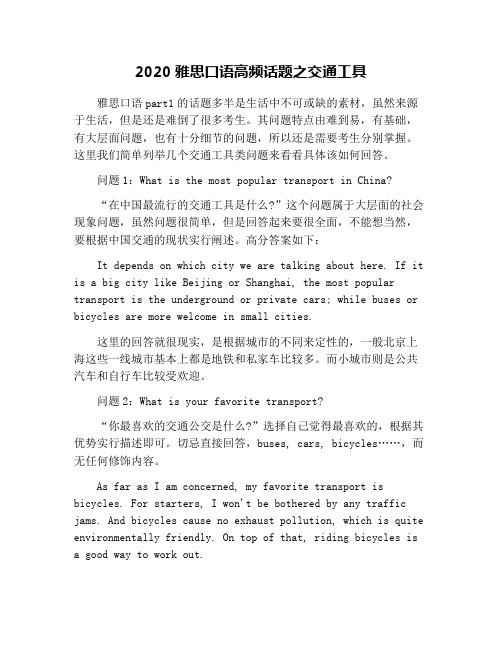
2020雅思口语高频话题之交通工具雅思口语part1的话题多半是生活中不可或缺的素材,虽然来源于生活,但是还是难倒了很多考生。
其问题特点由难到易,有基础,有大层面问题,也有十分细节的问题,所以还是需要考生分别掌握。
这里我们简单列举几个交通工具类问题来看看具体该如何回答。
问题1:What is the most popular transport in China?“在中国最流行的交通工具是什么?”这个问题属于大层面的社会现象问题,虽然问题很简单,但是回答起来要很全面,不能想当然,要根据中国交通的现状实行阐述。
高分答案如下:It depends on which city we are talking about here. If it is a big city like Beijing or Shanghai, the most popular transport is the underground or private cars; while buses or bicycles are more welcome in small cities.这里的回答就很现实,是根据城市的不同来定性的,一般北京上海这些一线城市基本上都是地铁和私家车比较多。
而小城市则是公共汽车和自行车比较受欢迎。
问题2:What is your favorite transport?“你最喜欢的交通公交是什么?”选择自己觉得最喜欢的,根据其优势实行描述即可。
切忌直接回答,buses, cars, bicycles……,而无任何修饰内容。
As far as I am concerned, my favorite transport is bicycles. For starters, I won't be bothered by any traffic jams. And bicycles cause no exhaust pollution, which is quite environmentally friendly. On top of that, riding bicycles is a good way to work out.这里的答案也是相当全面的,根据交通拥和污染方面做了简单介绍,其实也能够根据健康——能够锻炼身体展开陈述。
雅思常用交通工具(史上最全最精辟)

雅思常用交通工具(史上最全最精辟)汽车类自行车bike /bicycle摩托车motorcycle大客车coach班车shuttle bus中巴minibus计程汽车,出租汽车taxi/cab厢式货车van [v?n]重型卡车lorry拖拉机tractor二轮马车cart / ka:t/四驱车four-wheel drive四轮马车carriage救护车ambulance长途旅行车greyhound bus运载工具;车辆;飞行器;航天器vehicle ['vi:ikl]相关词汇stop 停车站taxi rank/taxi stand 计程汽车车站, 出租汽车总站taxi driver/cab driver 出租车司机conductor 售票员inspector 检查员, 稽查员ride 乘车minimum fare (of a taxi) 最低车费expressway/freeway 高速公路火车类地铁subway/tube/underground铁路railway轻轨light rail快客列车express (train)双层公共汽车double decker['dek?] bus无轨电车trolley(bus)连写['tr?li]电车, 有轨电车tram(car), street(car)连写快车fast train直达快车through train慢车stopping train/slow train游览列车excursion [iks'k?:??n] train市郊火车commuter [k?'mju:t?] train/suburban train 轨道车railcar双层卧铺车sleeper with couchettes [ku:'?et]行李车luggage van/baggage car邮政车mail car相关词汇:Coach/ carriage 车厢sleeping car/sleeper 卧车dining car/ restaurant car/luncheon car 餐车berth [b?θ]/ bunk [b??k] 铺位railway system, railway net-work 铁路系统station/railway station 车站station hall 车站大厅booking office/ticket office 售票处car attendant, train attendant 列车员ticket-collector/gateman 收票员ticket inspector 验票员platform 月台, 站台platform ticket 站台票buffet ['b?f?t] 小卖部waiting room 候车室terminal ['t?m?nl], terminus 终点站platform bridge 天桥left-luggage office 行李暂存处platform-ticket 验票门guard/conductor 列车长rack/baggage rack 行李架left-luggage office 行李房(美作:checkroom) timetable 时刻表change/transfer 换乘connection 公铁交接处porter 搬运工人to change trains at... 在(某地)换车the train is due at... 在(某时)到达to break the journey 中途下车船游船/快艇yacht [j?t]大船vessel ['vesl]军舰warship邮轮, 客轮(passenger) liner帆船sailing boat/sailing ship远洋班轮(ocean) liner定期客船, 班轮packet boat气垫船hovercraft渡船ferry游艇游览river cruise相关词汇cabin 船舱life buoy 救生圈lifeboat 救生艇life jacket 救生衣berth, cabin, stateroom 客舱first-class stateroom (cabin) 头等舱second-class stateroom (cabin) 二等舱steerage, third-class 三等舱steerage 统舱gang-plank 跳板crossing 横渡cruise [kruz] 游弋to embark, to ship 乘船to land 抵岸, to sail at a speed of 20 knots, 航速为20节to transship 换船to disembark 上岸to board a ship; to embark; to go aboard 上船to disembark from a ship, to go ashore, to land 下船on board a ship, aboard 在船上to stop over at... 中途在…停留飞机喷气飞机jet [d?et]宇宙飞船spaceship航天飞机space/airport shuttle直升飞机helicopter ['helik?pt?]客机airliner/passenger aircraft民用航空civil aviation相关词汇passenger cabin 客舱tourist class /economy class 普通舱, 经济舱first class 一等舱business class 商务仓waiting list 登机票名单customs formalities 报关单boarding check 登机牌airport 航空港air terminal 航空集散站tarmac ['tɑr,m?k] 停机坪air hostess, stewardess ['stjuw?d?s]空中小姐, 女乘务员steward 乘务员aircraft crew, air crew 机组, 机务人员pilot ['pa?l?t] 驾驶员, 机长takeoff 起飞landing 着陆to board a plane, get into a plane 上飞机to get off a plane, alight from a plane 下飞机non-stop flight to 飞往, 直飞in transit 运送中的air pocket 气潭, 气阱场景reserve预定make a reservation预定confirm a reservation确认预定book a room/table 预订房间/饭桌cancel one's reservation取消预定first come, first serve先到先服务原则(即不设预订服务)one-way/single ticket单程票 round-trip/return ticket往返票。
雅思培训丨雅思大作文交通类话题解析
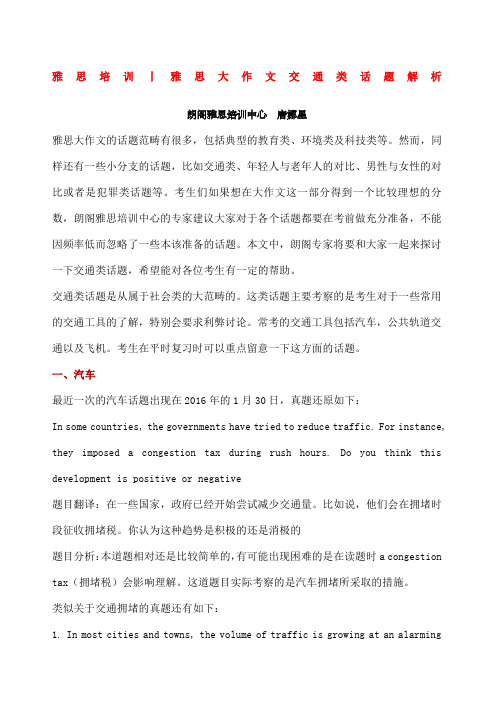
雅思培训丨雅思大作文交通类话题解析朗阁雅思培训中心唐娜星雅思大作文的话题范畴有很多,包括典型的教育类、环境类及科技类等。
然而,同样还有一些小分支的话题,比如交通类、年轻人与老年人的对比、男性与女性的对比或者是犯罪类话题等。
考生们如果想在大作文这一部分得到一个比较理想的分数,朗阁雅思培训中心的专家建议大家对于各个话题都要在考前做充分准备,不能因频率低而忽略了一些本该准备的话题。
本文中,朗阁专家将要和大家一起来探讨一下交通类话题,希望能对各位考生有一定的帮助。
交通类话题是从属于社会类的大范畴的。
这类话题主要考察的是考生对于一些常用的交通工具的了解,特别会要求利弊讨论。
常考的交通工具包括汽车,公共轨道交通以及飞机。
考生在平时复习时可以重点留意一下这方面的话题。
一、汽车最近一次的汽车话题出现在2016年的1月30日,真题还原如下:In some countries, the governments have tried to reduce traffic. For instance, they imposed a congestion tax during rush hours. Do you think this development is positive or negative题目翻译:在一些国家,政府已经开始尝试减少交通量。
比如说,他们会在拥堵时段征收拥堵税。
你认为这种趋势是积极的还是消极的题目分析:本道题相对还是比较简单的,有可能出现困难的是在读题时a congestion tax(拥堵税)会影响理解。
这道题目实际考察的是汽车拥堵所采取的措施。
类似关于交通拥堵的真题还有如下:1. In most cities and towns, the volume of traffic is growing at an alarmingrate. Discuss about the main causes and give possible solutions.题目翻译:在一些城市和城镇,汽车量在呈现一个急剧上升的趋势。
在雅思口语中交通方式的比较要怎么表达?整理

让知识带有温度。
在雅思口语中交通方式的比较要怎么表达?整理在雅思口语中交通方式的比较要怎么表达?今日我为大家整理的是关于雅思口语中交通方式的比较,这对大家的雅思口语素材会很有关心哦,盼望大家可以好好利用起来,下面就让我们一起来看一下吧。
一、Cars:1. 车的类型(types of cars):compact car 紧凑型车; mid-size 中等大小的车; full-size 加长车; sports car 运动型车;车的设计,声音和性能the design, sound, performance of the car ;2. 有车的好处( benefits of having a car):1) 代表着社会地位: resembles / represents a social status2) 代表着胜利和财宝:It is a symbol of success and wealth。
3) 享受驾驶和速度的乐趣: It is a joy of speeding and driving。
4) 在寒冷的气候下走很长的距离去坐公交车或等很长的时间是特别苦痛的:Its a pain having to walk long distance or wait a long time for the bus in cold weather。
5) 当自己有车的时候,可以去你想去的地方,不用依靠别人:When you have your own car, you can go wherever you want, whenever第1页/共3页千里之行,始于足下。
you want, without being dependent on anyone else。
6) 假如没有车,靠别人开车带你去工作的话,迟到的几率比较大:If you dont have a vehicle and depend on others to drive you to work, you have a greater chance of arriving late。
口语中的交通和交通工具表达

口语中的交通和交通工具表达在日常口语交流中,交通和交通工具是我们经常涉及的话题之一。
掌握一些常用的交通和交通工具表达,可以帮助我们更好地与他人进行交流。
本文将介绍口语中常用的交通和交通工具表达,以及相关的用法和例句。
一、交通工具的名称1. 汽车(Car)- 汽车是一种四轮驱动的交通工具。
例句:I drive my car to work every day.(我每天开车上班)2. 公交车(Bus)- 公交车是一种大型载客交通工具。
例句:I take the bus to school.(我坐公交车上学)3. 地铁(Subway)- 地铁是一种在地下运行的城市轨道交通工具。
例句:I prefer taking the subway during rush hour.(高峰期我更喜欢坐地铁)4. 自行车(Bicycle)- 自行车是一种人力驱动的交通工具。
例句:I ride my bicycle to the park every weekend.(每个周末我骑自行车去公园)5. 摩托车(Motorcycle)- 摩托车是一种两轮驱动的交通工具。
例句:He enjoys riding his motorcycle on the open road.(他喜欢在开阔的道路上骑摩托车)6. 火车(Train)- 火车是一种长途铁路交通工具。
例句:We took a train to visit our relatives.(我们坐火车去探亲)7. 飞机(Airplane)- 飞机是一种空中交通工具。
例句:She travels to different countries by airplane for her job.(她工作需要坐飞机去不同的国家)8. 船(Boat)- 船是一种在水上航行的交通工具。
例句:We went fishing on a boat yesterday.(昨天我们去钓鱼了)二、交通工具的动词短语1. 开车(Drive)- 表示驾驶汽车或其他交通工具。
雅思口语part2话题卡: Describe a trip that you went on by public transportation 乘公交工具旅行.doc

雅思口语part2话题卡: Describe a trip that you went on by public transportation 乘公交工具旅行思路点拨:以下原创思路谨供参考,希望大家根据自己的真实经历编写答案这道题也属于变形金刚类型的话题卡,也就是我们常常在雅思口语中见到的老题翻新的题目,曾经有考过Describe a car journey you went on(烤鸭们可以当做灵感来源)这次的旅行变成了乘坐public transportation(公共交通),那么哪些交通工具算作是公共交通的一部分呢?比如最常见的巴士?(bus),还有地铁(subway)。
好了,接下来就得思考一下你去哪儿玩了。
公交一般都不会特别远。
所以,可以是一场郊外游,或者是城内一日观光游等等。
下面是小编根据题目的具体要求,给出的原创参考答案:禁止其它机构转载抄袭雅思文章Describe a trip that you went on by public transportationYou should say:What it isWhen you went thereWho you were withAnd explain how you felt about it一次我乘坐交通工具旅行的经历发生在西安,当时有一辆巴士,从西安城区开往著名景区兵马俑。
I trip that I had by public transportation was taken place in Xi’an. It was a bus that led us to one of the famous tourist spot, the Terror Cotta Warriors, from the downtown of Xi’an.那会儿大约是在八年前读大学的的一个夏季周末。
我那天本来打算不想去任何地方的,但是我的一位美国朋友的朋友从德州刚过来,所以想请我做下他们的导游去那里玩玩。
关于交通工具雅思作文英语

关于交通工具雅思作文英语The Importance of Transportation in Modern Society。
Transportation is an essential part of modern society. It plays a crucial role in connecting people, goods, and services, and it has a significant impact on the economy, environment, and quality of life. In this essay, we will discuss the importance of transportation in modern society and its impact on various aspects of our lives.First and foremost, transportation is essential for connecting people and communities. It allows people to travel to work, school, and other essential services, andit enables them to visit friends and family. Without transportation, people would be isolated and unable to access the opportunities and resources that are essential for a fulfilling life. In addition, transportation connects communities to each other, facilitating trade, tourism, and cultural exchange.Furthermore, transportation is crucial for the economy. It enables the movement of goods and services, linking producers to consumers and businesses to markets. Without transportation, the economy would grind to a halt, and businesses would be unable to operate. In addition, transportation creates jobs and stimulates economic growth, as it requires a vast network of infrastructure, vehicles, and services.Moreover, transportation has a significant impact on the environment. The burning of fossil fuels in vehicles contributes to air pollution and greenhouse gas emissions, which have negative effects on public health and the climate. In recent years, there has been a growing awareness of the need to develop sustainable transportation solutions, such as electric vehicles and public transit, to reduce the environmental impact of transportation.In addition, transportation has a profound impact on the quality of life. It affects the accessibility of essential services, such as healthcare and education, andit influences the livability of communities. Efficient andreliable transportation systems can improve the quality of life by reducing congestion, improving air quality, and providing access to recreational and cultural amenities.In conclusion, transportation is an essential part of modern society, with a significant impact on the economy, environment, and quality of life. It plays a crucial rolein connecting people, goods, and services, and it is essential for the functioning of the economy and the well-being of communities. As we continue to face challengessuch as urbanization, population growth, and climate change, it is essential to develop sustainable transportation solutions that can meet the needs of the present without compromising the ability of future generations to meettheir own needs.。
雅思口语话题之交通工具语料汇总
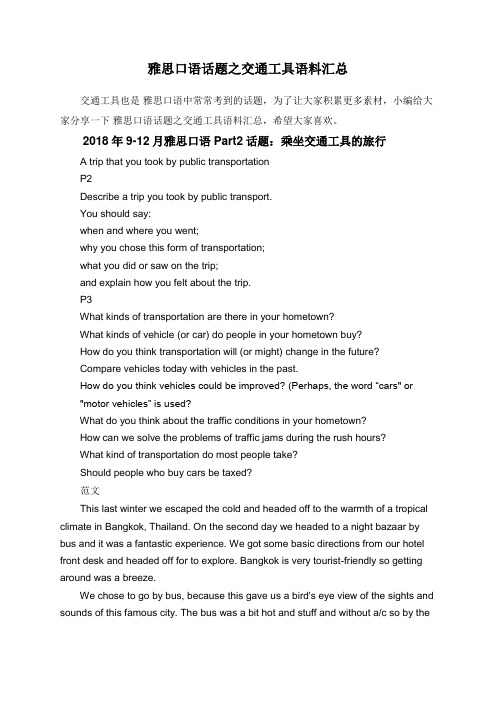
雅思口语话题之交通工具语料汇总交通工具也是雅思口语中常常考到的话题,为了让大家积累更多素材,小编给大家分享一下雅思口语话题之交通工具语料汇总,希望大家喜欢。
2018年9-12月雅思口语Part2话题:乘坐交通工具的旅行A trip that you took by public transportationP2Describe a trip you took by public transport.You should say:when and where you went;why you chose this form of transportation;what you did or saw on the trip;and explain how you felt about the trip.P3What kinds of transportation are there in your hometown?What kinds of vehicle (or car) do people in your hometown buy?How do you think transportation will (or might) change in the future?Compare vehicles today with vehicles in the past.How do you think vehicles could be improved? (Perhaps, the word “cars" or"motor vehicles” is used?What do you think about the traffic conditions in your hometown?How can we solve the problems of traffic jams during the rush hours?What kind of transportation do most people take?Should people who buy cars be taxed?范文This last winter we escaped the cold and headed off to the warmth of a tropical climate in Bangkok, Thailand. On the second day we headed to a night bazaar by bus and it was a fantastic experience. We got some basic directions from our hotel front desk and headed off for to explore. Bangkok is very tourist-friendly so getting around was a breeze.We chose to go by bus, because this gave us a bird's eye view of the sights and sounds of this famous city. The bus was a bit hot and stuff and without a/c so by thetime we got to the night market we were sweating like pigs. The experience was one I don't think I would like anytime soon.We saw some amazing sights, from the historic palaces through to tuk-tuks and backpackers spread throughout the city. The night market was really a great experience. We bought a bunch of souvenirs and Thai snacks and ate some of the local delicacies. Bangkok is a city that never sleeps, and we were like kids in a candy store.The trip made me feel really energized and motivated to travel more in the future. It sparked my interest in southeast Asia and since then I have been to a few more similar countries. I feel alive when I travel and experience new adventures.雅思口语高分范文:一个重要的交通工具Describe an important form of transport for youI want to describe the bus, which is probably the most common form of transport for most of us in Suzhou. I probably use the bus about 10 or more times in a week.I use it not just to go back and forth to work but also to go shopping. I have a monthly pass and so I can travel freely on one without having to pay each time I go on. I also use a bus when I want to go traveling from one place to another for distances that do not last fur more than a day. I do have a bicycle, but I use that only for very" short distance" things, like getting some vegetables at the local grocery store or things like that. I prefer taking the bus. I always feel safe taking a bus because it is a big vehicle and it moves more slowly than a taxi. It is quite convenient, since there are enough lines. Even though it is not as convenient as a car, it allows you to work while you are traveling. It is relatively cheap compared to a car and a subway, and it can be comfortable, although it can be a bit crowded, and it's not so nice if you have to stand for long distances. I like buses most because I can talk with people and make more friends. Riding a bus also has its disadvantages, like sometimes it can be a bit crowded, and you do have to watch for pickpockets. But overall it's the best option I have. Besides, if everyone were to drive a car, then the environment would be severely polluted.雅思口语必备词汇(交通篇)1. airport 机场2. bicycle 自行车3. bus 公共汽车4. coach 长途客车5. compact 小轿车6. compartment 车厢7. corridor 走廊8. arrival time 到达时间9. delay 晚点10. elevator 电梯11. entrance 入口12. exit 出口13. flight 班机14. lobby 大厅15. overpass 天桥16. passenger 乘客17. pedestrian 行人18. sleeper 卧铺19. rack 行李架20. spaceship 宇宙飞船21. staircase 楼梯22. underground/subway 地铁23. underpass 地下通道24. departure lounge (出发)休息室25. departure time 出发时间26. drink-driving /drunk-driving 酒后开车27. be stuck in the traffic jam 塞车28. boarding pass/card 登机牌/卡29. bus pass 公交一卡通30. dead(right ) on time 准点31. economy class 经济舱32. E-ticket(electronic ticket ) 电子票33. fatigue driving 疲劳驾驶34. first class 头等舱35. flight attendant 空姐36. flight crew 机组人员37. flight number 航班号38. left luggage office 行李寄存处39. light railway/rail 轻轨40. means of transport 交通工具41. motor vehicle 机动车辆42. motorbike 摩托车43. motoring offence 违章驾驶44. mountain bike 山地车45. off-road vehicle 越野车46. on time 正点47. platform ticket 站台票48. reservation 预定49. return ticket 往返票50. rush hour 上下班高峰期51. security camera 监控摄像头52. security checks 安检53. sidewalk/pavement 人行道54. single/one-way ticket 单程票55. ticket inspector 检票员56. traffic condition 交通状况57. traffic jam/congestion 交通堵塞58. traffic/road/car accident 交通事故59. train attendant 列车员60. vehicle type 车辆类型2019年5-8月雅思口语part 2话题思路拓展:交通工具出故障雅思口语part2:Describe an experience that the vehicle you took broke down in your travelYou should say:Where it happenedWhen it happenedWho you were with at that timeAnd what impacts this breakdown had先来看题目的要点:旅行中交通工具抛锚的经历。
雅思口语话题之交通工具种类

雅思口语话题之交通工具种类交通是人们日常生活衣食住行中不可缺少的一部分。
关于交通方式的选择、交通问题的现状和解决办法是一个全球性的话题。
因此这些问题也不可避免地成为雅思口语考试的高频话题。
下面小编给大家带来雅思口语话题之交通工具种类,来看看吧!雅思口语话题之交通工具种类Describe a kind of transportation you like best. You should say:What it is.How often you use it.Why you like it best.What the advantages and disadvantages of it are.1.a) If I had to describe the type of transportation I like best, I would choose train transport, also called rail transport.b) I am sure you have made use of a train often before.2.a) In most modern countries there is a well-developed railway system.b) That is to say, one can travel or send goods to almost any destination.3.a) I travel by train whenever I have the opportunity.b) For example, when visiting friends or relatives, I prefer traveling by train as opposed to flying or going by bus.There are several reasons as for why I prefer train transport. Allow me to explain by mentioning some of them briefly.4.a) First of all, traveling by train is relatively inexpensive.b) What I mean to say is that most people can afford to make use of the train when they need to.5.a) Secondly, trains (also called railroads) can be used to transport large quantities of goods over great distances.b) For instance, many products such as machinery are very large and heavy, and therefore difficult to transport by air or road.6.a) Lastly, I believe there is a human factor involved in a train trip.b) That is to say, you have the opportunity to meet and talk to some interesting people on a long train trip, and who knows, you might even make some new friends.7. So, those were some thoughts on the kind of transportation I like best.雅思口语范文之三种交通方式的对比Subway is obviously the fastest and safest form of commuting traffic.They are scheduled and frequent, not being affected by bad weather or heavy traffic.In China, train is definitely the most available and affordable form of transportation for long distances.Unlike a plane, train's soft seats and berths are more comfortable, as well as room-ier. Adjustable footrests, tables and chair recliners are all within easy reach.Planes are known for long security lines and strict rules for carry-on items. Trains,however, have very short lines and less restriction on hand luggage.Speaking of food, airplanes have long been known for small meals that lack taste. First class is supposed to have something with higher quality, but that means paying the extra cost for first-class seating.Trains, however, provide much more choices when it comes to dining.With large windows on all sides, train riders can view the passing scenery if they choose to.While taking a train can be cheaper, nothing beats an airplane in speed.While watching a plane take off can be amazing, it is a rather short experience. Once inflight, looking out a window will usually reveal nothing but white clouds.交通工具 Transportation | 雅思口语头脑风暴系列★★★交通工具分类★★★Public transport① bus:-various and flexible routes(多样、灵活的路线), cheap/affordable for everyone,easy to change, have special drives(车道) in the city, environmentally-friendly-too crowded during rush hours② subway/metro/underground/tube:-fast, always on schedule(准时), there’s no need to concern about traffic congestion-the routes are not as flexible as bus③ taxi:-fast, convenient for new visitors or people who are in a hurry-relatively expensive, some drivers will cheat onvisitors(make a detour 绕远路),are easily caught in the traffic④ train:-economical, relatively safe,can enjoy the splendid scenery on the way, can make friends with passengers, suitable for people who suffer from acrophobia(恐高症)or people who can’t take pla nes-might delay, will spend too much time on the way, the seats/berths(座位/铺位) are narrow which are uncomfortable⑤ plane:-fast, time-saving and energy-saving, better and cozy atmosphere, can enjoy considerate service and havea pleasant trip-too expensive, always delayed by weather(heavy fog/snow, thunderstorm), the risk is highcompared with trains(air crash 空难)⑥ shared bicycle/car:-newly popularized transportation tools in the city, extremely convenient touse(cheap/can be found almost everywhere in the city)-some people park those bikes disorderly, which causes a mess-those bikes are damaged by people with low qualityPrivate transport:① car:nearly a must for every family(commuting/travelling)-expensive to buy and expensive to maintain-are easily caught in the traffic② scooter(电动车):-popular tool in the city(economical/environmentally-friendly), also don’t have to worry about traffic congestion-some riders won’t obey the traffic rules★★★未来交通工具发展趋势★★★high speed 高速As our society develop rapidly, we value time more than ever, so speed become the priority that we will consider when choosing transportation. And so the high speed maglev trains(磁悬浮列车) will be widely developed in the future, which is promising(有希望/前途的).社会飞速发展,人们极其重视时间,所以在选择交通工具时,速度成了首要考虑因素。
交通工具变化 剑桥雅思作文
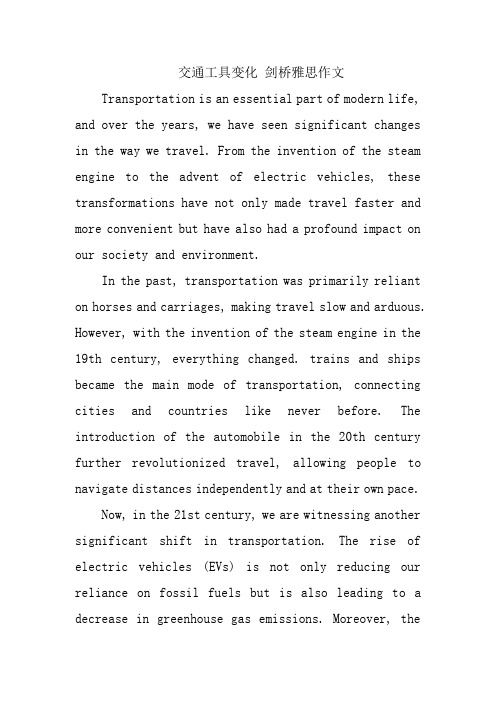
交通工具变化剑桥雅思作文Transportation is an essential part of modern life, and over the years, we have seen significant changes in the way we travel. From the invention of the steam engine to the advent of electric vehicles, these transformations have not only made travel faster and more convenient but have also had a profound impact on our society and environment.In the past, transportation was primarily reliant on horses and carriages, making travel slow and arduous. However, with the invention of the steam engine in the 19th century, everything changed. trains and ships became the main mode of transportation, connecting cities and countries like never before. The introduction of the automobile in the 20th century further revolutionized travel, allowing people to navigate distances independently and at their own pace.Now, in the 21st century, we are witnessing another significant shift in transportation. The rise of electric vehicles (EVs) is not only reducing our reliance on fossil fuels but is also leading to a decrease in greenhouse gas emissions. Moreover, thedevelopment of autonomous vehicles is poised to change the way we think about transportation altogether, potentially eliminating accidents caused by human error and improving traffic flow.The impact of these changes is far-reaching. Electric vehicles are not only cleaner but are also becoming more affordable and accessible to the general public. This shift towards sustainable transportation is essential in the fight against climate change, and it is encouraging to see governments and companies around the world investing in infrastructure and technology to support this transition.In conclusion, the change in transportation over the years has been remarkable. From the slow and uncertain journeys of the past to the fast, convenient, and sustainable options available today, it is clear that the future of transportation is electric and autonomous. These advancements hold the promise of not only improving our daily lives but also of creating a more sustainable and connected world.中文翻译:交通是现代生活的重要组成部分,多年来,我们看到了旅行方式的显著变化。
高铁方面的雅思口语
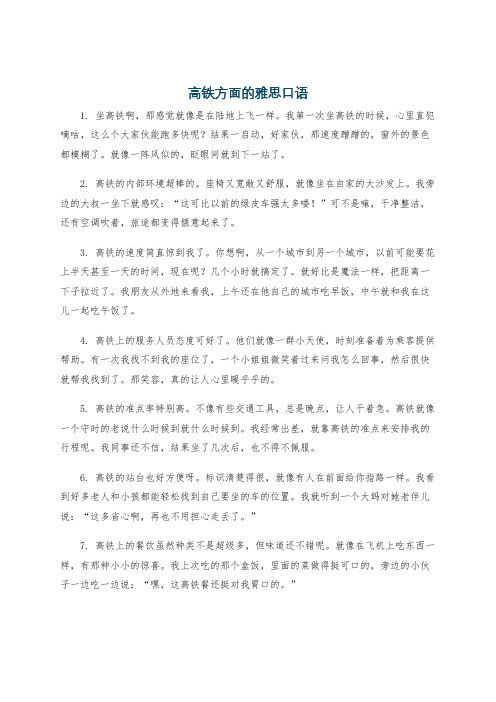
高铁方面的雅思口语1. 坐高铁啊,那感觉就像是在陆地上飞一样。
我第一次坐高铁的时候,心里直犯嘀咕,这么个大家伙能跑多快呢?结果一启动,好家伙,那速度蹭蹭的,窗外的景色都模糊了。
就像一阵风似的,眨眼间就到下一站了。
2. 高铁的内部环境超棒的。
座椅又宽敞又舒服,就像坐在自家的大沙发上。
我旁边的大叔一坐下就感叹:“这可比以前的绿皮车强太多喽!”可不是嘛,干净整洁,还有空调吹着,旅途都变得惬意起来了。
3. 高铁的速度简直惊到我了。
你想啊,从一个城市到另一个城市,以前可能要花上半天甚至一天的时间,现在呢?几个小时就搞定了。
就好比是魔法一样,把距离一下子拉近了。
我朋友从外地来看我,上午还在他自己的城市吃早饭,中午就和我在这儿一起吃午饭了。
4. 高铁上的服务人员态度可好了。
他们就像一群小天使,时刻准备着为乘客提供帮助。
有一次我找不到我的座位了,一个小姐姐微笑着过来问我怎么回事,然后很快就帮我找到了。
那笑容,真的让人心里暖乎乎的。
5. 高铁的准点率特别高。
不像有些交通工具,总是晚点,让人干着急。
高铁就像一个守时的老说什么时候到就什么时候到。
我经常出差,就靠高铁的准点来安排我的行程呢。
我同事还不信,结果坐了几次后,也不得不佩服。
6. 高铁的站台也好方便呀。
标识清楚得很,就像有人在前面给你指路一样。
我看到好多老人和小孩都能轻松找到自己要坐的车的位置。
我就听到一个大妈对她老伴儿说:“这多省心啊,再也不用担心走丢了。
”7. 高铁上的餐饮虽然种类不是超级多,但味道还不错呢。
就像在飞机上吃东西一样,有那种小小的惊喜。
我上次吃的那个盒饭,里面的菜做得挺可口的,旁边的小伙子一边吃一边说:“嘿,这高铁餐还挺对我胃口的。
”8. 坐高铁的时候,看窗外的风景是一种享受。
那田野、山川、河流就像一幅流动的画卷在眼前展开。
我记得有个小女孩兴奋地指着窗外对她妈妈说:“妈妈,快看,那片花海好漂亮啊!”感觉整个旅途都充满了诗意。
9. 高铁的安全性那是没得说的。
雅思口语交通话题范文
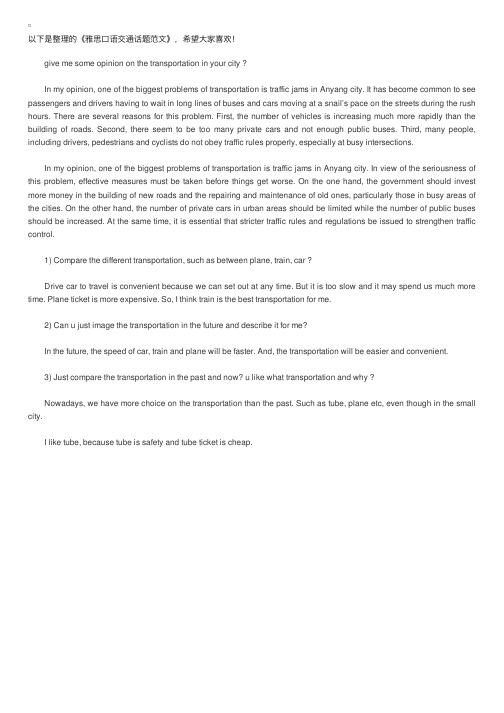
以下是整理的《雅思⼝语交通话题范⽂》,希望⼤家喜欢!give me some opinion on the transportation in your city ?In my opinion, one of the biggest problems of transportation is traffic jams in Anyang city. It has become common to see passengers and drivers having to wait in long lines of buses and cars moving at a snail’s pace on the streets during the rush hours. There are several reasons for this problem. First, the number of vehicles is increasing much more rapidly than the building of roads. Second, there seem to be too many private cars and not enough public buses. Third, many people, including drivers, pedestrians and cyclists do not obey traffic rules properly, especially at busy intersections.In my opinion, one of the biggest problems of transportation is traffic jams in Anyang city. In view of the seriousness of this problem, effective measures must be taken before things get worse. On the one hand, the government should invest more money in the building of new roads and the repairing and maintenance of old ones, particularly those in busy areas of the cities. On the other hand, the number of private cars in urban areas should be limited while the number of public buses should be increased. At the same time, it is essential that stricter traffic rules and regulations be issued to strengthen traffic control.1) Compare the different transportation, such as between plane, train, car ?Drive car to travel is convenient because we can set out at any time. But it is too slow and it may spend us much more time. Plane ticket is more expensive. So, I think train is the best transportation for me.2) Can u just image the transportation in the future and describe it for me?In the future, the speed of car, train and plane will be faster. And, the transportation will be easier and convenient.3) Just compare the transportation in the past and now? u like what transportation and why ?Nowadays, we have more choice on the transportation than the past. Such as tube, plane etc, even though in the small city.I like tube, because tube is safety and tube ticket is cheap.。
雅思听力场景词汇:交通工具

雅思听力场景词汇:交通工具为了帮助大家高效备考雅思,店铺为大家带来雅思听力场景词汇:交通工具,希望对大家雅思备考有所帮助。
更多精彩尽请关注店铺!雅思听力场景词汇:交通工具double deck bus 双层车tram 有轨电车trolley bus 无轨电车shuttle bus 班车taxi/cab 出租车lorry 卡车truck 卡车trailer 拖车underground 地铁subway 地铁tube 伦敦地铁metro 地铁系统ferry 渡轮cruise 游轮row boat 划船sunshield 遮阳板windscreen 挡风玻璃wheel 轮子steering wheel 方向盘tyre 轮胎make 牌子boot/trunk 汽车后备箱brake 刹车horn 喇叭ignition 点火雅思听力精听到底怎么做对于精听,我们需要了解以下几个方面。
雅思听力精听须知第一,什么是精听?精听(intensive listening)和泛听(extensive listening)练习的侧重点有很大不同,一般来说,同学们能够掌握这篇材料的中心大意,能听出关键词句就可以了。
泛听注重的是“量”——进行广泛大量选取不同的听力材料进行训练。
相反,精听则是需要反复多次对同一篇听力材料进行训练,不仅要理解材料的内容大意,还要听懂每词每句,注重“细节”。
那么对于剑桥真题来说,精听训练也应听出一篇材料的文章结构和语言特点。
雅思听力精听须知第二,为什么要做精听?我遇到的很多前来新东方进行培训的VIP一对一学员,在上课之前都对雅思听力备考抱有这样的想法:只要把剑桥真题全部都做一遍就没问题了。
但事实上,如此复习雅思听力的同学不但没有发现自己的听力和理解能力有明显提高,甚至还在“原地踏步”,失去了对听力的信心和积极性。
因为他们只是简单地认为只要“量”达到了,就一定会产生“质变”,所以之前做错的题目,练习后重做还是会错。
【徐州雅思英语培训】雅思写作话题交通运输及社交工具详解

雅思写作话题:交通运输及社交工具详解朗阁海外考试研究中心雅思写作不仅是对各位考生语言水平的考试,更是对考生们在较短时间内能否有逻辑地思考问题的能力提出了极高的要求。
那么本文中,笔者将对雅思写作出现概率较高的科技类问题进行一个思路上的梳理,同时提供一些比较实际的答题思路,以帮助各位考生赢得与时间的竞争。
首先,我们要清楚科技类的出题规律。
各种高科技的产品都有可能出现在考题中,在这里,我们把它们分为2类,分别是交通运输和社交工具。
一、交通运输在这个分类下,一般包括了airplane, automobile等较为先进的交通工具。
此类话题一般不会单独出题,会和环境相联系,或让考生比较其优劣。
下面我们就以两道真题为题,进行讲解。
Nowadays, cheap air travel is increasingly popular in the world. To what extentdo you think its advantages outweigh its disadvantages?这是一个非常典型的比较题。
在面对此类问题时,建议考生选择好处多于坏处,这样可以降低我们论述的难度。
就文章结构而言,中间3段中,有2段论述优点,1段论述缺点(这个缺点最好还可以被克服)。
下面,我们首先来列举现在交通工具的好处:1. 让我们的生活更方便make our life more convenient2. 促进了各地区的交流和发展promote regional communication and developmentife3. 丰富了人们的生活enrich peo ple’s l缺点:1. 污染环境–克服办法:不断改革技术,提高燃油使用率Pollute our environment –keep updating our technology and improving the efficiency of using fuel2. 造成拥堵–克服办法:提倡绿色出行方式,合理规划道路Lead to traffic jam –advocate the “Green Transportation” and plan our roads sensibly考生可以在以上论点中任意选择,然后完成整篇文章的写作。
雅思口语关于交通

雅思口语关于交通引言交通是现代社会中不可或缺的一部分,它对我们的生活产生了深远的影响。
本文将探讨交通对城市发展、环境和个人生活的影响,并分析现代城市中的交通问题及其解决方案。
交通对城市发展的影响经济增长交通网络的发展促进了跨地区和国际贸易,增加了商业机会,推动了经济增长。
现代化的交通基础设施可以吸引投资和创造就业机会,提高生产力和效率。
城市规划交通是城市规划的核心要素之一,合理的交通规划可以促进城市的可持续发展。
通过合理规划道路、公共交通和停车设施,可以缓解交通拥堵和空气污染问题,改善居民的出行体验。
人口流动交通网络的改善使得人口流动更加便利。
人们可以更容易地在城市之间通勤,享受不同地区的就业和教育资源。
这种人口流动也促进了文化交流和知识传播。
交通对环境的影响空气污染交通是城市空气污染的主要源头之一。
机动车辆排放的废气对空气质量造成了严重影响,导致呼吸系统疾病和环境污染。
因此,采取措施减少交通排放对环境健康至关重要。
噪音污染交通流量大的地区往往伴随着噪音污染。
随着交通工具的增多和交通拥堵的加剧,耳膜听力受损等问题日益突出。
降低交通噪音对居民的生活质量有重要意义。
能源消耗交通对能源的需求巨大,主要依赖于化石燃料。
然而,这种能源消耗方式对环境产生了巨大的影响,因为它导致了二氧化碳等温室气体的排放,加剧了气候变化问题。
因此,探索可持续的交通方式对减缓全球变暖是至关重要的。
现代城市中的交通问题及解决方案交通拥堵交通拥堵是现代城市中最常见的问题之一。
为了解决这个问题,城市可以采取以下措施:•发展公共交通系统,提高公共交通的频率和覆盖范围,鼓励市民使用公共交通。
•规划合理的道路网络,避免瓶颈,提高道路通行能力。
•推广高效的交通管理技术,如智能交通系统和交通信号优化。
环境污染环境污染是交通带来的另一个主要问题。
以下是解决环境污染的一些举措:•鼓励使用低排放或零排放交通工具,如电动车、混合动力车辆和公共自行车。
雅思写作交通类
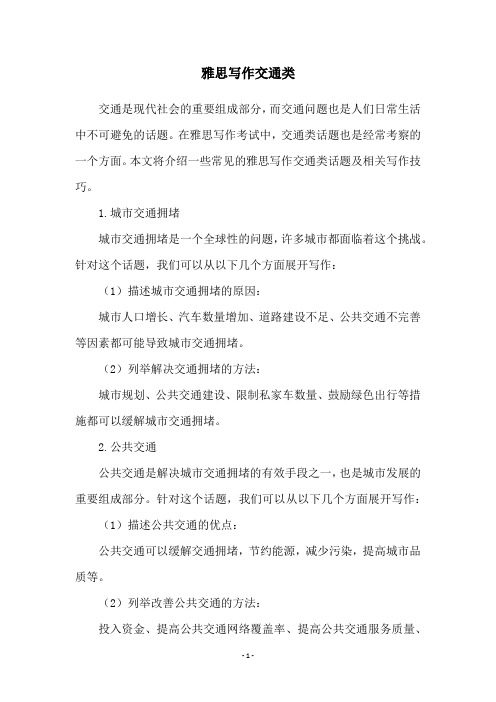
雅思写作交通类交通是现代社会的重要组成部分,而交通问题也是人们日常生活中不可避免的话题。
在雅思写作考试中,交通类话题也是经常考察的一个方面。
本文将介绍一些常见的雅思写作交通类话题及相关写作技巧。
1.城市交通拥堵城市交通拥堵是一个全球性的问题,许多城市都面临着这个挑战。
针对这个话题,我们可以从以下几个方面展开写作:(1)描述城市交通拥堵的原因:城市人口增长、汽车数量增加、道路建设不足、公共交通不完善等因素都可能导致城市交通拥堵。
(2)列举解决交通拥堵的方法:城市规划、公共交通建设、限制私家车数量、鼓励绿色出行等措施都可以缓解城市交通拥堵。
2.公共交通公共交通是解决城市交通拥堵的有效手段之一,也是城市发展的重要组成部分。
针对这个话题,我们可以从以下几个方面展开写作:(1)描述公共交通的优点:公共交通可以缓解交通拥堵,节约能源,减少污染,提高城市品质等。
(2)列举改善公共交通的方法:投入资金、提高公共交通网络覆盖率、提高公共交通服务质量、减少公共交通费用等都可以改善公共交通。
(3)探讨公共交通的未来发展:高速公路、轨道交通、自动驾驶技术等新技术的应用,将为公共交通带来更多的发展机会。
3.私家车与环境保护私家车是交通工具中的一种,但其也带来了许多环境问题。
针对这个话题,我们可以从以下几个方面展开写作:(1)私家车对环境的影响:私家车排放的废气、噪音、占用的道路面积等都对环境造成了不良影响。
(2)列举减少私家车的方法:提高燃油税、限制汽车的数量、鼓励绿色出行等都可以减少私家车的数量。
(3)探讨私家车与环境保护的平衡:私家车在现代社会中发挥了重要作用,但也需要平衡环保和交通发展之间的关系。
总之,交通类话题在雅思写作考试中是一个常见的考点。
我们需要了解交通问题的原因、解决方案以及对环境的影响等方面,以便更好地展开写作。
同时,也需要充分发挥自己的语言表达能力,使用恰当的语言、词汇和句式来表达自己的观点。
- 1、下载文档前请自行甄别文档内容的完整性,平台不提供额外的编辑、内容补充、找答案等附加服务。
- 2、"仅部分预览"的文档,不可在线预览部分如存在完整性等问题,可反馈申请退款(可完整预览的文档不适用该条件!)。
- 3、如文档侵犯您的权益,请联系客服反馈,我们会尽快为您处理(人工客服工作时间:9:00-18:30)。
雅思口语Part2常考话题:交通工具
本文为大家收集整理了雅思口语Part2常考话题:交通工具。
雅思口语Part2着重考察同学们的英语交流能力,同学们在备考阶段可以注意多积累素材,平时多模仿多练习,这样在考试中才不至于无话可说。
Describe an important form of transport for you
I want to describe the bus, which is probably the most common form of transport for most of us in Suzhou. I probably use the bus about 10 or more times in a week.
I use it not just to go back and forth to work but also to go shopping.
I have a monthly pass and so I can travel freely on one without having to pay each time I go on. I also use a bus when I want to go traveling from one place to another for distances that do not last fur more than a day. I do have a bicycle, but I use that only for very" short distance" things, like getting some vegetables at the local grocery store or things like that. I prefer taking the bus. I always feel safe taking a bus because it is a big vehicle and it moves more slowly than a taxi. It is quite convenient, since there are enough lines. Even though it is not as convenient as a car, it allows you to work while you are traveling. It is relatively cheap
compared to a car and a subway, and it can be comfortable, although it can be a bit crowded, and it's not so nice if you have to stand for long distances. I like buses most because I can talk with people and make more friends. Riding a bus also has its disadvantages, like sometimes it can be a bit crowded, and you do have to watch for pickpockets. But overall it's the best option I have. Besides, if everyone were to drive a car, then the environment would be severely polluted.。
